Related Research Articles
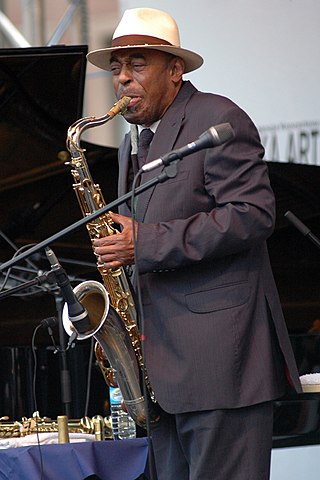
Archie Shepp is an American jazz saxophonist, educator and playwright who since the 1960s has played a central part in the development of avant-garde jazz.

James Emory Garrison was an American jazz double bassist. He is best remembered for his association with John Coltrane from 1961 to 1967.
Grachan Moncur III was an American jazz trombonist. He was the son of jazz bassist Grachan Moncur II and the nephew of jazz saxophonist Al Cooper.
Joe Lee Wilson was an American jazz singer from Bristow, Oklahoma, who lived in Europe since 1977.
William Godvin "Beaver" Harris was an American jazz drummer who worked extensively with Archie Shepp.

Marion Brown was an American jazz alto saxophonist, composer, writer, visual artist, and ethnomusicologist. He was a member of the avant-garde jazz scene in New York City during the 1960s, playing alongside musicians such as John Coltrane, Archie Shepp, and John Tchicai. He performed on Coltrane's landmark 1965 album Ascension. AllMusic reviewer Scott Yanow described him as "one of the brightest and most lyrical voices of the 1960s avant-garde."
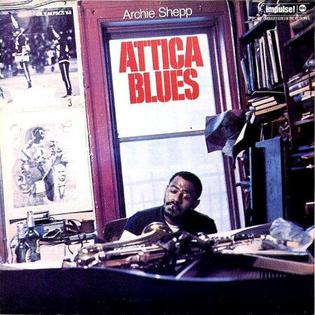
Attica Blues is an album by avant-garde jazz saxophonist Archie Shepp. Originally released in 1972 on the Impulse! label, the album title refers to the Attica Prison riots.
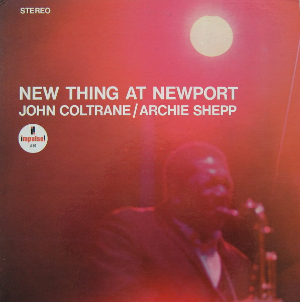
New Thing at Newport is a 1965 live album featuring two separate sets from that year's Newport Jazz Festival by tenor saxophonists John Coltrane and Archie Shepp. It was recorded four days after the recording session for Coltrane's album Ascension, on which Shepp appeared, and is one of several albums documenting the end stages of Coltrane's "classic quartet," which would begin to break up by the end of that year with the departure of McCoy Tyner.

Calvin "Cal" Massey was an American jazz trumpeter and composer.
Four for Trane is a studio album by tenor saxophonist Archie Shepp released on Impulse! Records in 1965. Four of the five tracks were composed and originally recorded by John Coltrane and rearranged by Shepp and trombonist Roswell Rudd. The other featured players are trumpeter Alan Shorter, alto saxophonist John Tchicai, bassist Reggie Workman and drummer Charles Moffett. Coltrane himself co-produced the album alongside Bob Thiele. The album was Shepp's first release for Impulse!

Things Have Got to Change is an album by avant-garde jazz saxophonist Archie Shepp released in 1971 on the Impulse! label. The album features a performance by Shepp with a large ensemble and vocal choir. The album "solidified the saxophonists reputation as a soulful, yet radical free jazz artist motivated by social commentary and cultural change".
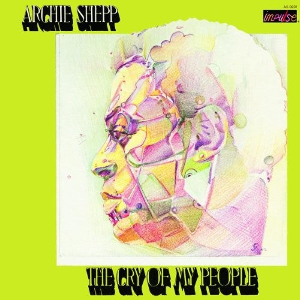
The Cry of My People is an album by avant-garde jazz saxophonist Archie Shepp released in 1972 on the Impulse! label. The album features performances by Shepp with gospel singers, big bands, quintets, sextets, and chamber orchestras. The AllMusic review by Thom Jurek states: "Shepp worked with many larger ensembles as a leader, but never did he achieve such a perfect balance as he did on The Cry of My People".

Kwanza is an album by Archie Shepp released on Impulse! in 1974. The album contains tracks recorded from September 1968 to August 1969 by Shepp with four different ensembles.
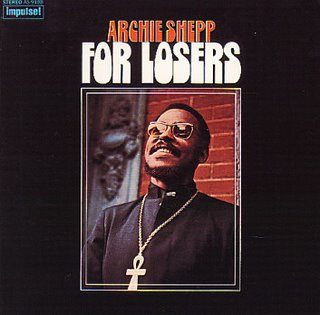
For Losers is an album by Archie Shepp released on Impulse! in 1970. The album contains tracks recorded from September 1968 to August 1969 by Shepp with three different ensembles. The AllMusic review by Rob Ferrier states "for anyone wishing to understand the music and career of this brilliant musician, this is an undervalued piece of the puzzle".

Mixed is a compilation album of two avant-garde jazz sessions featuring performances by the Cecil Taylor Unit and the Roswell Rudd Sextet. The album was released on the Impulse! label in 1998 and collects three performances by Taylor with Archie Shepp, Jimmy Lyons, Henry Grimes and Sunny Murray with Ted Curson and Roswell Rudd added on one track which were originally released under Gil Evans' name on Into the Hot (1961). The remaining tracks feature Rudd with Giuseppi Logan, Lewis Worrell, Charlie Haden, Beaver Harris and Robin Kenyatta and were originally released as Everywhere (1966). Essentially these are the three Cecil Taylor tracks from the "Gil Evans album" teamed with Roswell Rudd's Impulse album Everywhere, in its entirety.

Charles Davis was an American jazz saxophonist and composer. Davis played alto, tenor and baritone saxophone, and performed extensively with Archie Shepp and Sun Ra.
In the late 1960s, Latin jazz, combining rhythms from African and Latin American countries, often played on instruments such as conga, timbale, güiro, and claves, with jazz and classical harmonies played on typical jazz instruments broke through. There are two main varieties: Afro-Cuban jazz was played in the US right after the bebop period, while Brazilian jazz became more popular in the 1960s. Afro-Cuban jazz began as a movement in the mid-1950s as bebop musicians such as Dizzy Gillespie and Billy Taylor started Afro-Cuban bands influenced by such Cuban and Puerto Rican musicians as Xavier Cugat, Tito Puente, and Arturo Sandoval. Brazilian jazz such as bossa nova is derived from samba, with influences from jazz and other 20th-century classical and popular music styles. Bossa is generally moderately paced, with melodies sung in Portuguese or English. The style was pioneered by Brazilians João Gilberto and Antônio Carlos Jobim. The related term jazz-samba describes an adaptation of bossa nova compositions to the jazz idiom by American performers such as Stan Getz and Charlie Byrd.

Reginald Volney Johnson was an American jazz double-bassist.
Roger Blank is an American jazz drummer.
Calo Scott was a Cuban-American jazz cellist. Scott is noted for being one of earliest known jazz cellists. He established himself in the 1950s through working with the saxophonist Gerry Mulligan when “having a cello player as an improvising member of a jazz group was then virtually unheard of.” In addition to Gerry Mulligan, Calo Scott worked with Ahmed Abdul-Malik, Gato Barbieri, Marc Levin, and John Handy among others. He was also active in New York City's Lower East Side intermedia-arts scene, working with artists such as dancer-choreographer Mary McKay, artist Aldo Tambellini, and filmmaker Cassandra Einstein.
References
- ↑ Gary W. Kennedy writes, "obituaries published his age as 53; however, Sharpe himself gave his year of birth as 1931 in his application for social security.". "C. Sharpe". The New Grove Dictionary of Jazz . 2nd edition, ed. Barry Kernfeld, 2004.
- ↑ "The Collections ‹ Treasure of the Month :: The Rothschild Archive". www.rothschildarchive.org. Retrieved 2022-02-15.
- ↑ Pareles, Jon (30 January 1990). "Clarence (C) Sharpe Dead at 53; Played Jazz on Saxophone". The New York Times.